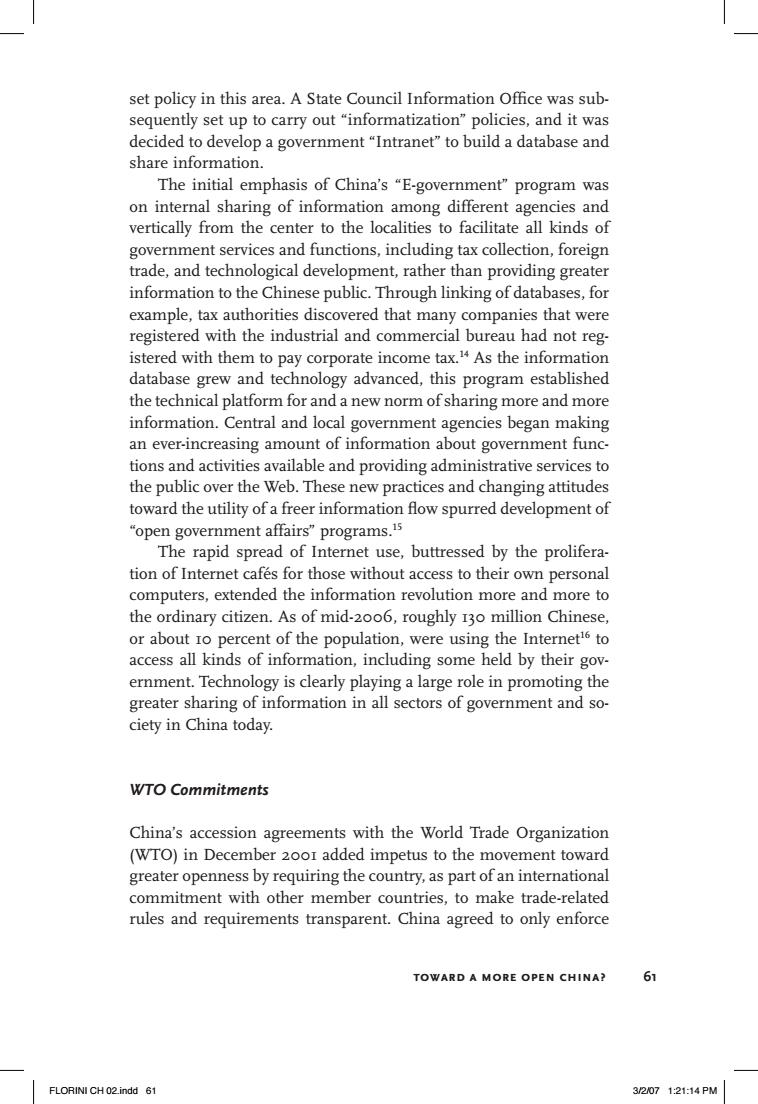正在加载图片...

set policy in this area.A State Council Information Office was sub- sequently set up to carry out "informatization"policies,and it was decided to develop a government"Intranet"to build a database and share information. The initial emphasis of China's "E-government"program was on internal sharing of information among different agencies and vertically from the center to the localities to facilitate all kinds of government services and functions,including tax collection,foreign trade,and technological development,rather than providing greater information to the Chinese public.Through linking of databases,for example,tax authorities discovered that many companies that were registered with the industrial and commercial bureau had not reg- istered with them to pay corporate income tax.As the information database grew and technology advanced,this program established the technical platform for and a new norm of sharing more and more information.Central and local government agencies began making an ever-increasing amount of information about government func- tions and activities available and providing administrative services to the public over the Web.These new practices and changing attitudes toward the utility of a freer information flow spurred development of “open government affairs”programs.s The rapid spread of Internet use,buttressed by the prolifera- tion of Internet cafes for those without access to their own personal computers,extended the information revolution more and more to the ordinary citizen.As of mid-2006,roughly 13o million Chinese, or about ro percent of the population,were using the Internet'6 to access all kinds of information,including some held by their gov- ernment.Technology is clearly playing a large role in promoting the greater sharing of information in all sectors of government and so- ciety in China today. WTO Commitments China's accession agreements with the World Trade Organization (WTO)in December zooI added impetus to the movement toward greater openness by requiring the country,as part of an international commitment with other member countries,to make trade-related rules and requirements transparent.China agreed to only enforce TOWARD A MORE OPEN CHINA? 61 FLORINI CH02indd 61 3/2071:21:14PMtoward a more open china? 61 set policy in this area. A State Council Information Office was subsequently set up to carry out “informatization” policies, and it was decided to develop a government “Intranet” to build a database and share information. The initial emphasis of China’s “E-government” program was on internal sharing of information among different agencies and vertically from the center to the localities to facilitate all kinds of government services and functions, including tax collection, foreign trade, and technological development, rather than providing greater information to the Chinese public. Through linking of databases, for example, tax authorities discovered that many companies that were registered with the industrial and commercial bureau had not registered with them to pay corporate income tax.14 As the information database grew and technology advanced, this program established the technical platform for and a new norm of sharing more and more information. Central and local government agencies began making an ever-increasing amount of information about government functions and activities available and providing administrative services to the public over the Web. These new practices and changing attitudes toward the utility of a freer information flow spurred development of “open government affairs” programs.15 The rapid spread of Internet use, buttressed by the proliferation of Internet cafés for those without access to their own personal computers, extended the information revolution more and more to the ordinary citizen. As of mid-2006, roughly 130 million Chinese, or about 10 percent of the population, were using the Internet16 to access all kinds of information, including some held by their government. Technology is clearly playing a large role in promoting the greater sharing of information in all sectors of government and society in China today. WTO Commitments China’s accession agreements with the World Trade Organization (WTO) in December 2001 added impetus to the movement toward greater openness by requiring the country, as part of an international commitment with other member countries, to make trade-related rules and requirements transparent. China agreed to only enforce FLORINI CH 02.indd 61 3/2/07 1:21:14 PM